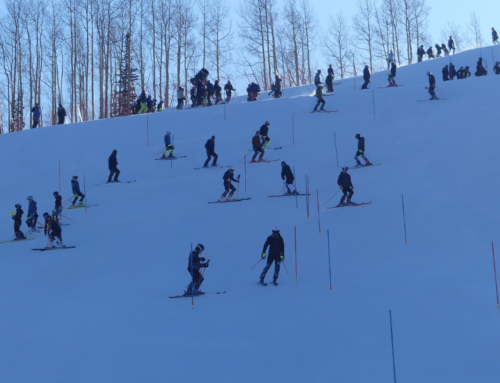A healthy brain will dictate Macartney's return
Scott Macartney is used to the rigors involved in recovering from an injury while racing the World Cup circuit. Wrench you back? Stretch it out. Strain a leg muscle? Get to the gym and work it back into shape.
But the injury Macartney sustained in a scary crash during the Hahnenkamm downhill Jan. 19 at Kitzbühel was a severe concussion — and the only thing that can fully heal a bruised brain is time and rest. A lot of rest. Doctors have instructed the 30-year-old U.S. Ski Team veteran downhiller to rest and let his brain heal, and for an athlete used to pushing his mind and body to the edge week after week on the World Cup circuit, that’s difficult.
“Right now, I want to improve my brain function, and what do I do?” Macartney said. “Sit around, and don’t do anything that causes you to get exerted. That’s tough.”

SCOTT MACARTNEY is used to the rigors involved in recovering from an injury while racing the World Cup circuit. Wrench you back? Stretch it out. Strain a leg muscle? Get to the gym and work it back into shape.
But the injury Macartney sustained in a scary crash during the Hahnenkamm downhill Jan. 19 at Kitzbühel was a severe concussion — and the only thing that can fully heal a bruised brain is time and rest. A lot of rest. Doctors have instructed the 30-year-old U.S. Ski Team veteran downhiller to rest and let his brain heal, and for an athlete used to pushing his mind and body to the edge week after week on the World Cup circuit, that’s difficult.
“Right now, I want to improve my brain function, and what do I do?” Macartney said. “Sit around, and don’t do anything that causes you to get exerted. That’s tough.”
Macartney recently spoke with Ski Racing after returning from Austria to USSA headquarters in Park City to undergo a series of tests designed to measure his brain function.
“Right now I actually feel pretty good physically,” said Macartney, who added that “ninety-nine percent of the time you’re ready to go mentally but your back is sore, or you knee has some tendonitis you’re trying to work out, something like that.
“So many races I’ve been ready to go and it’s been something physical. Now the tables are turned.”
The medical team at USSA, headed by medical director Richard Quincy, will measure Macartney’s brain function and alertness with trademark ImPACT tests built around the baseline ImPACT test Macartney took when he was 100 percent healthy. Six days after the accident, in which Macartney crashed off the final jump of the Streif course and banged his head multiple times on the icy track and losing consciousness, he was battling a slight headache and a general feeling of cloudiness.
“It’s an overall feeling of cloudiness, not as sharp on the recollection of certain people’s names,” Macartney said. “[I’m] going through things and saying, ‘oh yeah, what was that thing I was just talking about half an hour ago.’ A lot of that stuff is still not 100 percent.”
Macartney said that his hip is a little sore, adding that “it feels like I could use a good workout and a stretch, but I’m not allowed to get my heart rate up at this point.”
And he won’t get the OK from doctors to begin working out again until those tests show Macartney’s brain is healing.
“You feel a certain way and then you can start to visit the ImPACT tests again,” he said. “[That] feeling of cloudiness and not being 100 percent mentally in the memory has to disappear before I can get the heart rate going.”
His heart was indeed racing as Macartney barreled into that final jump on the course. Macartney remembers feeling his left ski get a little higher than his right at takeoff and trying to correct his balance before landing.
He ran out of time.
“I remember the start of the crash, I just don’t remember from when my head hit to when I came across the finish line,” he said. “It’s just as you think. Everything’s recording until the very last moment and then that’s it.”
Despite the accident, Macartney is determined to return to World Cup downhill racing, whenever that may be. He knows the risks involved in the sport and accepts them, as does nearly every downhiller on the circuit.
“… You realize that you take risks that are not insignificant. You’re out there, you’re doing crazy stuff everyday,” he said. “Like Kitzbühel, in itself, is dangerous. It’s nuts. You don’t have a 100 percent expectation of coming out of it OK. I think everyone, if you got a real, honest answer, will tell you that they’ve thought about the future and what are you going to do [after racing].
“I know what [the risks] are, I think everyone does. You make decisions accordingly and I’ve already made it. [This accident] isn’t really changing much.”





















